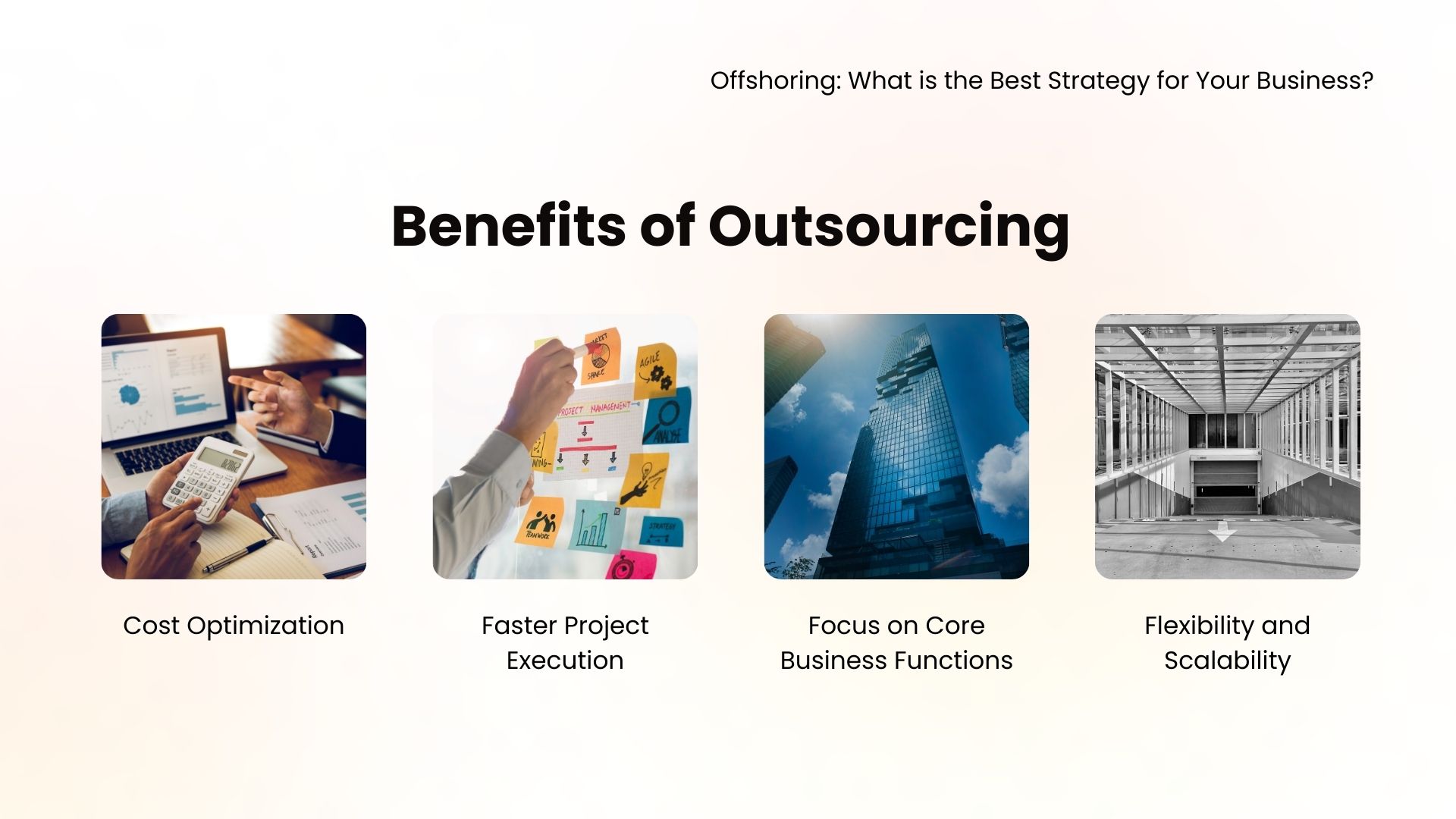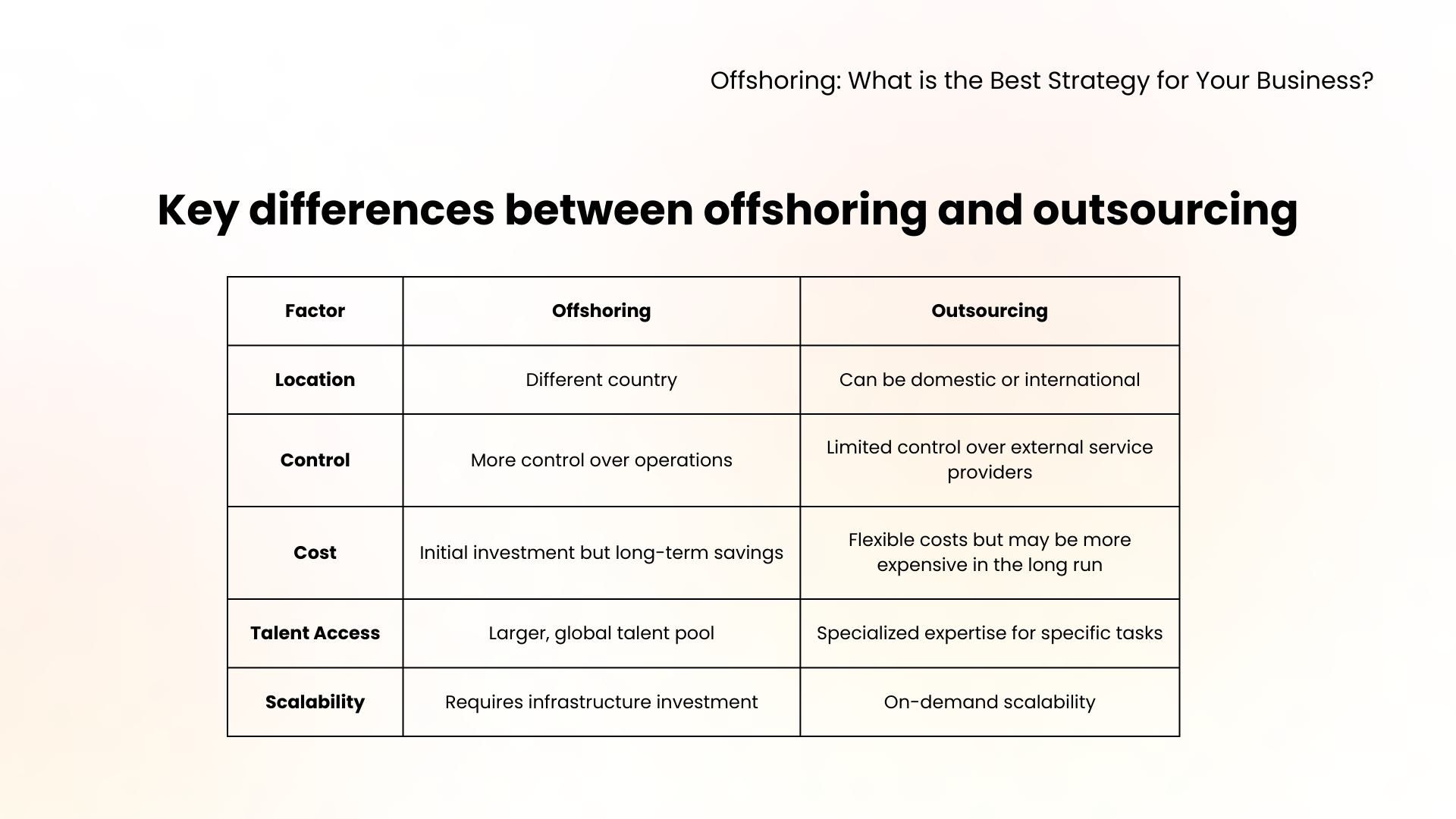In today’s globalized economy, businesses are constantly searching for ways to reduce costs, improve efficiency, and access specialized talent. Two of the most common strategies for achieving these goals are offshoring and outsourcing. However, many companies struggle to determine which approach is the best fit for their needs.
This article breaks down the differences between offshoring and outsourcing, explores their respective advantages and disadvantages, and provides insights into when to choose one over the other.

What is Offshoring?
Offshoring refers to relocating business operations or processes to a foreign country, typically to capitalize on lower labor costs, tax benefits, or access to skilled talent. Unlike outsourcing, where third-party providers handle business functions, offshoring usually involves setting up an in-house team or subsidiary in another country.
Benefits of Offshoring
1. Lower Labor Costs
Offshoring allows businesses to operate in countries with lower wages while maintaining control over their processes. For example, Vietnam has become a hotspot for software development due to its cost-effective yet highly skilled workforce.
2. Business Continuity & Scalability
Operating in different time zones means work can continue around the clock, increasing productivity and accelerating project timelines.
3. Access to Global Talent
Many countries offer niche expertise that may not be available locally. For instance, the IT sector in India and Vietnam has a large talent pool specializing in AI, software development, and IT infrastructure.
4. Market Expansion Opportunities
Establishing operations in a new country helps businesses penetrate foreign markets and adapt their products or services to local consumer preferences.
Challenges of Offshoring
- Cultural and language barriers can create miscommunication and misunderstandings.
- Time zone differences may lead to scheduling conflicts, requiring efficient project management.
- Quality control can be an issue if offshore teams do not follow the same standards as the parent company.
What is Outsourcing?
Outsourcing is the practice of hiring an external third-party provider to handle specific business processes, such as IT services, customer support, or manufacturing. Unlike offshoring, outsourcing does not necessarily involve moving operations overseas.
Benefits of Outsourcing
1. Cost Optimization
Outsourcing eliminates the need to invest in infrastructure and full-time employees. Companies only pay for the services they need, reducing operational expenses.
2. Faster Project Execution
With outsourcing, businesses can quickly onboard experienced professionals without the long hiring and training processes required for in-house teams.
3. Focus on Core Business Functions
By delegating tasks like payroll, customer service, or IT support, companies can concentrate on strategic growth initiatives.
4. Flexibility and Scalability
Outsourcing allows businesses to scale their workforce up or down based on demand without long-term commitments.

Challenges of Outsourcing
- Lack of direct control over processes and operations.
- Security risks associated with sharing sensitive business data with third-party providers.
- Hidden costs in vendor contracts, service upgrades, or compliance requirements.

When Should You Choose Offshoring vs. Outsourcing?
When to Choose Offshoring
- You require a dedicated, long-term team that aligns with your company culture.
- You need to expand into new markets and establish a presence in a foreign country.
- You are working on cost-sensitive projects that require ongoing optimization.
When to Choose Outsourcing
- You need to complete short-term projects quickly without hiring full-time staff.
- You want to focus on your core business while outsourcing non-core functions.
- You lack internal expertise in specialized fields such as IT, digital marketing, or legal services.
The bottom line
Both offshoring and outsourcing offer unique benefits depending on your business objectives, budget, and growth strategy. While offshoring provides greater control and long-term cost savings, outsourcing offers flexibility and faster execution for specific tasks.
About Innovators Hub Asia
Innovators Hub Asia is an innovative technology system that combines 2,000 top innovators and tech talents and cutting-edge technology to deliver AI-driven solutions tailored to the business’s unique challenges. It aims to revolutionize business operations and accelerate growth through a wide range of services, including aiLabs, TalentCloud, Tech Venture Builder, and Co-Innovation Builder.






